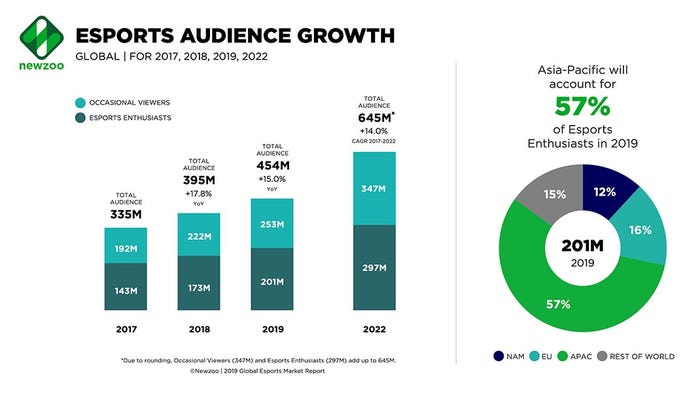- Sports & Nutrition
- Formulation
- Supplements
- Specialty Nutrients
- Herbs & Botanicals
- Natural Product Development
Esports market: Niche but worth paying attention to
Featuring ingredients such as L-theanine, ginseng and citicoline, functional beverages geared toward egamers are gaining momentum.

Insider Takes
Gamers require mental and physical endurance that may require hand-eye coordination, multitasking and strategy.
The esports functional beverage market is entering a new phase with several brands going beyond caffeine claims.
L-tyrosine, citicoline, L-theanine, ginseng, Bacopa monnieri and antioxidants are among the popular ingredients.
Esports—competitive, organized video gaming—may seem like a recent phenomenon, but it actually made its debut back in 1972. At Stanford University’s Artificial Intelligence Laboratory, about 20 students competed in the 1st tournament, named “Intergalactic Spacewar Olympics.” The prizes? Annual subscriptions to Rolling Stone magazine. Nearly 50 years later, hundreds of esports tournaments occur annually with major ones selling out arenas … Madison Square Garden-sized arenas. The prizes? Up to millions of dollars. Esports is a rapidly growing market, gaining legitimacy on many fronts: several esports celebrities are making seven-figures, over 100 colleges have esports teams, and most significantly, esports now garners millions of views. According to Newzoo, a video game market research firm, total esports viewership is expected to reach 645 million in 2022, a compound annual growth rate (CAGR) of 14% for 2017 to 2022.

Source: Newzoo | 2019 Global Esports Market Report
This burgeoning market opens up advertising opportunities for brands—including food, beverage and supplement companies—to a very targeted, engaged audience. Activate Consulting estimates 62% of U.S. esports viewers are between the ages of 18 and 341 and unlike traditional sports, a majority of viewers actually play the game they watch. Gamers typically play for hours at a time and products catering to such conditions are finding success. Just like athletes who turn to sports drinks for hydration, some gamers turn to functional beverages for their needs. However, in addition to hydration, they are also in need of energy, focus and good vision. Despite their reputation as couch potatoes, gamers require both mental and physical endurance for hours of play that may require hand-eye coordination, multitasking, strategy or a combination of these. Major beverage brands have already entered into the esports market. Red Bull was an early entrant when it sponsored David Walsh, a professional Halo player, back in 2006; and Mountain Dew followed just a year later with Game Fuel, a product line of its soda with boosted caffeine, specifically made for the gamer community.
The esports functional beverage market is entering into a new phase with several brands, both blue chips and startups, going beyond caffeine claims. Phrases such as “helps maintain optimal mental well-being, concentration, attention and memory” (NAU Drinks), “to promote healthy cell production” (G FUEL), and “to improve accuracy and alertness” (Mountain Dew) are increasingly popping up. Brands are turning to familiar dietary supplement ingredients to provide these functions. These include herbs such as Spanish sage (NAU Drinks), bioactive compounds such as antioxidants and vitamins (G FUEL), and nootropics such as caffeine and L-theanine (Mountain Dew). Nootropics are the new “it” ingredients when it comes to esports beverages. According to the Merriam-Webster dictionary, nootropics are substances that enhance cognition and memory and facilitate learning, but they also have a reputation for boosting energy, improving performance and reducing stress—hitting all the sweet spots for gamers.
Nootropics vary in range, from synthetic to natural ingredients and active compounds to whole food powders. The more prevalent active compounds found in esports beverages include L-tyrosine for stress, citicoline for focus, and L-theanine for energy. L-theanine is especially popular since it is said to work synergistically with caffeine to not only provide physical energy, but mental energy as well (Nutr Rev. 2008;66[2]:82-90). As for whole food powders, ginseng and Bacopa monnieri are among the frontrunners due to their association with cognitive health. Ginseng has been historically used for improving memory and fighting fatigue, a necessity when staring at a screen for hours, while Bacopa has been historically used for increasing concentration and enhancing cognitive function, a benefit when it comes to strategic thinking.
Whole food powders outside the nootropics category are making their way into esports beverages, as well. Both natural sources of antioxidants and caffeine are increasingly being listed on ingredient labels. G FUEL, a beverage brand founded specifically for the gamer market, features an “antioxidant complex” in its products. Some contain the company’s S7 antioxidant complex made up of blueberry, broccoli, green tea, kale and turmeric extracts, and others contain its regular antioxidant complex made up of over a dozen fruit powders. Mountain Dew’s latest iteration of the Amp Game Fuel product line contains yerba mate on top of caffeine and L-theanine for energy. Both these companies are finding success with their formulations: G FUEL’s three-year annual revenue growth was 214% from 2015 to 2018, and Mountain Dew has ramped up its marketing efforts toward the esports market. In 2019, Nicole Portwood, vice president of marketing at Mountain Dew, announced the company would spend 40% of its marketing dollars that year to reach gamers.
Esports, though currently a niche market, is growing at a rapid pace. In 2019, esports generated US$1.1 billion in revenue with $456 million coming from sponsorship deals, a 34.3% increase year-over-year, noted Newzoo. It is a market that food, beverage and supplement companies should at least keep a pulse on. If the numbers are not convincing enough, the investment of iconic brands and the success of startups should be. Fortunately, the ingredients that address the needs of gamers are already well-established within their existing industries and gaining ground within esports. Successfully reaching the budding gamer audience will come down to product formulation, packaging and advertising.
Rikka Cornelia is the product manager for Martin Bauer. She has a bachelor’s degree in economics from the University of California, Irvine.
About the Author
You May Also Like

